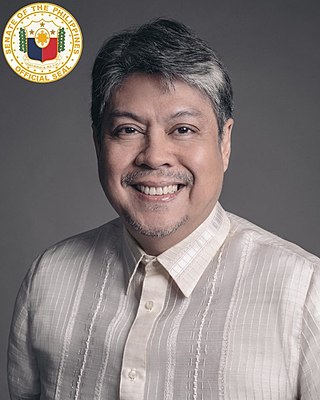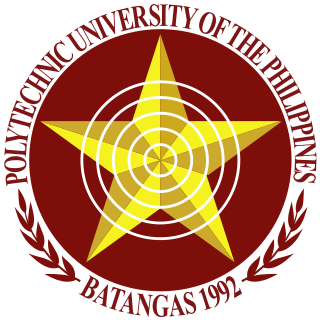The government of Argentina, within the framework of a federal system, is a presidential representative democratic republic. The president of Argentina is both head of state and head of government. Executive power is exercised by the president. Legislative power is vested in the National Congress. The Judiciary is independent from the Executive and from the Legislature, and is vested in the Supreme Court and the lower national tribunals. From the own government is also called Presidency of the Nation.

The president of the Senate is the presiding officer of the Australian Senate, the upper house of the Parliament of Australia. The counterpart in the lower house is the speaker of the House of Representatives. The office of the presidency of the senate was established in 1901 by section 17 of the Constitution of Australia. The primary responsibilities of the office is to oversee senate debates, determine which senators may speak, maintain order and the parliamentary code of conduct during sessions and uphold all rules and orders of the senate. The current president is Sue Lines, who was elected on 26 July 2022.

The speaker of a deliberative assembly, especially a legislative body, is its presiding officer, or the chair. The title was first used in 1377 in England.

A student council is an administrative organization of students in different educational institutes ranging from elementary schools to universities and research organizations around the world. These councils exist in most public and private K-12 school systems in different countries. Many universities, both private and public, have a student council as an apex body of all their students' organisations. Student councils often serve to engage students in learning about democracy and leadership, as originally espoused by John Dewey in Democracy and Education (1917).
The Georgetown University Student Association (GUSA) is the undergraduate student government of Georgetown University in Washington, D.C. The GUSA bylaws state that the organization's mission is "to (i) empower Hoyas by giving them control over resources, (ii) improve the student quality of life, (iii) safeguard Hoya rights, (iv) involve Hoyas in the governance of the University, and (v) ensure that the University conducts itself in an ethical and responsible manner."
The Associated Students of the University of Washington (ASUW) is the student association at the University of Washington. It is funded and supported by the University's Services and Activities Fee with which it provides services that directly and indirectly benefit student life. The ASUW consists of over 80 student employees and 500 volunteers, and the organization spends approximately $1.5 million annually to run events, lobby the legislature, and fund various Registered Student Organizations as they put on their own programs.

Franklin Magtunao Drilon is a Filipino lawyer and former politician. He had the longest tenure in the Senate of the Philippines, having served four non-consecutive terms overall: from 1995 to 2007 and 2010 to 2022. He has served thrice as president of the Senate: in 2000, from 2001 to 2006, and from 2013 to 2016.
Carl Ware is an American businessman. He is a retired executive vice-president of The Coca-Cola Company.

Francis Pancratius "Kiko" Nepomuceno Pangilinan is a Filipino lawyer, politician, and farm owner who served as a Senator from 2001 to 2013 and from 2016 to 2022. He was the Senate Majority Leader from 2004 to 2008.
The student government president is generally the highest-ranking officer of a student union. While a student government group and a class president are very similar to each other in some ways, the main difference between them is that while a class president represents a specific grade within the school, the student government president represents the school's entire student body.
A university council may be the executive body of a university's governance system, an advisory body to the university president, or something in between in authority.

Peter C. Groff is a former member of the Obama administration and a former Colorado legislator and President of the Colorado Senate. An attorney, public servant, and political veteran, Groff was elected as a Democrat to the Colorado House of Representatives in 2000, then re-elected in 2002. In 2003, he was appointed to the Colorado Senate, where he represented Senate District 33, which includes northeastern Denver, Colorado. Groff was the first African-American to serve as Colorado Senate president pro tem and Senate President. In May 2009, he was selected by President Barack Obama to head the faith- based-initiatives center for the U.S. Department of Education.

The University Student Council of the University of the Philippines Diliman is the official student representative body of the Philippines' premiere institution of higher learning. As such, it represents the interests of the students within and outside the University. The University Student Council, also known as USC, exists to represent UP students in various affairs of the University, acting as the voice of students in the local, national, and international issues.

Polytechnic University of the Philippines Santo Tomas, officially as Polytechnic University of the Philippines – Santo Tomas, Batangas Branch (PUP–STB) is one of the branch campuses of the Polytechnic University of the Philippines located in Santo Tomas, Batangas. PUP–STB was established through a Memorandum of Agreement (MOA) between former PUP President Nemesio Prudente and the Municipal Government of Santo Tomas under Leopoldo Laurel Jr. in 1991. PUP–STB is the only academic institution in Santo Tomas which acts as the community college and serves other municipalities in Batangas and Laguna province.

Adefemi Kila is a Nigerian politician and engineer who served in the Senate, representing Ekiti Central in April 2007 just after working for Julius Berger Nigerian Plc for 30 years as a civil engineer and as a technical manager (administration) for 18 years. He is currently a council member of Standards Organisation of Nigeria SON. He is a devoted Christian of the Anglican church of Nigeria.

The United States Senate is the upper chamber of the United States Congress. The Senate and the United States House of Representatives comprise the federal bicameral legislature of the United States. Together, the Senate and the House have the authority under Article One of the U.S. Constitution to pass or defeat federal legislation. The Senate has exclusive power to confirm U.S. presidential appointments to high offices, approve or reject treaties, and try cases of impeachment brought by the House. The Senate and the House provide a check and balance on the powers of the executive and judicial branches of government.

The Undergraduate Student Government (USG) at Stony Brook University is a governing body representing the undergraduate students of Stony Brook University. As with most student governments in the United States, one of USG's main functions is to recognize, fund and regulate student organizations. The USG is composed of an executive, a legislative, and a judicial branch. Along with the Graduate Student Organization, USG is the only other organization authorized to distribute the Student Activity Fee (SAF) in a viewpoint-neutral manner. In accordance with State University of New York Policies and Procedures, the mandatory SAF provides the USG with an annual budget of approximately $3.1 million, independently of the state budget.
The Associated Students of the University of Hawaiʻi at Mānoa (ASUH) is the undergraduate student government representing the 10,000+ full-time, classified, undergraduate students at the University of Hawaiʻi at Mānoa. ASUH was chartered by the University of Hawaiʻi Board of Regents in 1912 and was originally named the Associated Students of the College of Hawai'i.

The George Washington University Student Government Association is the student government of the George Washington University in Washington, DC. The SGA is responsible for advocacy on behalf of the GW student body at and is modeled after the U.S. Federal Government and consists of three branches: legislative, executive and judicial.
The University of Central Florida Student Government is the student body government for the University of Central Florida, a metropolitan public research university located in Orlando, Florida, United States. It is the largest Student Government within the state of Florida and one of the largest in the United States. It also often places in the top ten Student Governments nationally for the services and outreach it provides for the students it serves. SG also serves as the liaison between the student body and University Administration. The Executive, Legislative and Judicial branches as well as the Election Commission are governed by the student-adopted Constitution.












